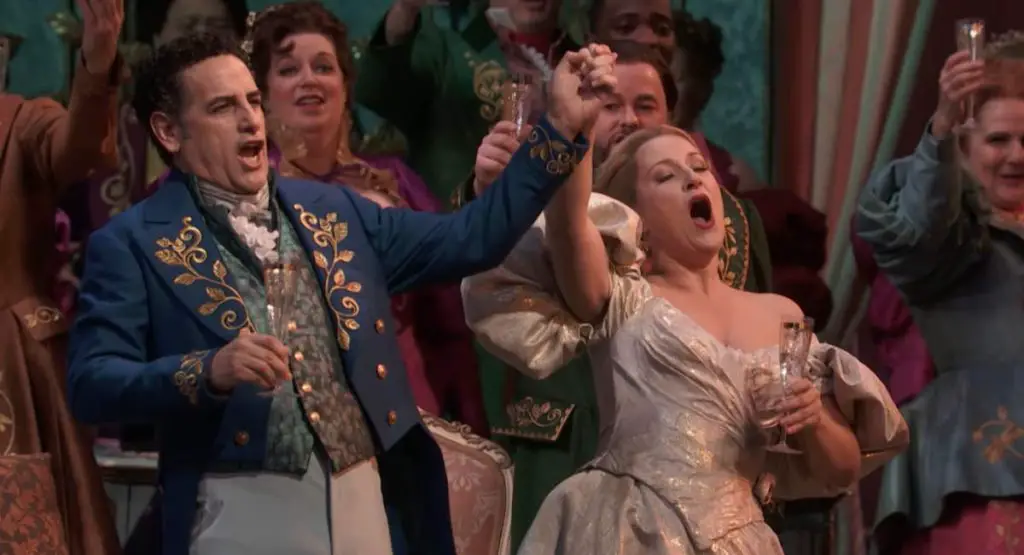Accompanied by the MET orchestra and chorus, the Polish soprano Aleksandra Kurzak and the Ukrainian tenor Dmytro Popov sing “Libiamo ne’ lieti calici” (English: “Let’s drink from the joyful cups”), a famous duet with a chorus from Giuseppe Verdi’s La Traviata, an 1853 opera in three acts. It is one of the best-known opera songs. Production: Michael Mayer. Conductor: Karel Mark Chichon. Videography by Pete Scalzitti, Met Opera.
Giuseppe Verdi’s Libiamo, ne’ lieti calici
“Libiamo, ne’ lieti calici” is a famous brindisi, an Italian term for a drinking song, from Giuseppe Verdi’s opera “La Traviata.” This opera, first performed in 1853, is one of Verdi’s most celebrated works and a staple of the operatic repertoire worldwide. “La Traviata” translates to “The Fallen Woman” in English and is based on the play “La Dame aux Camélias” by Alexandre Dumas fils, which in turn was adapted from his own novel of the same name.
The aria “Libiamo, ne’ lieti calici,” which translates to “Let’s drink from the joyful cups,” is sung in the first act of the opera. It is performed by the main characters, Violetta and Alfredo, during a high-society party at Violetta’s house. The song is a celebration of love and life, encapsulating the themes of pleasure and fleeting happiness that are central to the opera’s narrative.
Musically, this piece is lively and effervescent, mirroring the festive atmosphere of the party scene in which it is set. The melody is memorable and has a distinct Italian operatic character, full of emotion and drama. The lyrics invite the listeners to enjoy the present moment, to revel in the joys of love and wine.
“Libiamo, ne’ lieti calici” is not just an iconic piece from “La Traviata” but also one of the most recognizable arias in all of opera. It has been performed and recorded by countless opera singers over the years, often serving as an ambassador of opera to the wider public. Its popularity extends beyond the opera house, featuring in various movies, television shows, and advertisements, making it a part of popular culture as well as a high art form.
The aria also showcases Verdi’s mastery in composing for the human voice, blending emotional depth with vocal virtuosity. It’s a testament to his ability to convey complex human emotions through music, making “La Traviata” one of the most emotionally resonant and enduring operas in the repertoire.
Libiamo ne’ lieti calici lyrics [libretto]
The text was written by the Italian opera librettist Francesco Maria Piave (18 May 1810 – 5 March 1876).
Italian: Libiamo ne’ lieti calici
Alfredo
Libiamo, libiamo ne’ lieti calici
che la bellezza infiora;
e la fuggevol, fuggevol ora
s’inebrii a voluttà.
Libiam ne’ dolci fremiti
che suscita l’amore,
poiché quell’occhio al core onnipotente va.
Libiamo, amore, amor fra i calici
più caldi baci avrà.
Flora, Gastone, Barone, Dottore, Marchese, coro
Ah, libiam, amor fra’ calici
più caldi baci avrà.
Violetta
Tra voi, tra voi saprò dividere
il tempo mio giocondo;
tutto è follia, follia nel mondo
ciò che non è piacer.
Godiam, fugace e rapido
è il gaudio dell’amore;
è un fior che nasce e muore,
ne più si può goder.
Godiam, c’invita, c’invita un fervido
accento lusinghier.
Flora, Gastone, Barone, Dottore, Marchese, coro
Ah, godiamo, la tazza, la tazza e il cantico,
le notti abbella e il riso;
in questo, in questo paradiso ne scopra il nuovo dì.
Violetta: La vita è nel tripudio.
Alfredo: Quando non s’ami ancora.
Violetta: Nol dite a chi l’ignora.
Alfredo: È il mio destin così.
Tutti
Ah, godiamo, la tazza, la tazza e il cantico,
le notti abbella e il riso;
in questo, in questo paradiso ne scopra il nuovo dì.
Ah, ah, ne scopra il dì. (Ne sco, il no, il novo dì.)
Ah, ah, ne scopra il dì. (Ne sco, il no, il novo dì.)
Ah, sì… (Sì, ne scopra, ne scopra il nuovo dì…)
English: Let’s drink from the joyful cups
Alfredo
Let’s drink, let’s drink from the joyous chalices
where beauty blossoms.
And may the fleeting moment
be elated with voluptuousness.
Let’s drink from the sweet thrills
that love arouses
because that eye aims straight to the almighty heart.
Let’s drink, my love: the love among chalices
will have warmer kisses.
Flora, Gastone, Barone, Dottore, Marchese, Chorus
Ah, let’s drink, my love: the love among chalices
will have warmer kisses.
Violetta
With you, with you, I’ll be able to share
my cheerful times.
Everything is foolish in the world
which is not pleasure.
Let’s enjoy ourselves, for a fleeting and quick
the delight of love is:
it’s a flower that blooms and dies
and can no longer be enjoyed.
Let’s enjoy ourselves, fervent
flattering voice invites us.
Flora, Gastone, Barone, Dottore, Marchese, Chorus
Ah, let’s enjoy the cup, the cup, and the chants,
the embellished nights and the laughter;
let the new day find us in this paradise.
Violetta: Life means celebration.
Alfredo: If one hasn’t known love.
Violetta: Don’t tell someone who doesn’t know.
Alfredo: But this is my fate.
All
Ah, let’s enjoy the cup, the cup, and the chants,
the embellished night and the laughter;
let the new day find us in this paradise.
Ah, ah, let the new day find us. (We shall let the new day find us.)
Ah, ah, let the new day find us. (We shall let the new day find us.)
Ah, yes… (Yes, we shall let, we shall let the new day find us…)
Sources
- Libiamo ne’ lieti calici on Wikipedia
![Kurzak, Popov: "Libiamo ne' lieti calici [Verdi]](https://cdn-0.andantemoderato.com/wp-content/uploads/2024/01/Aleksandra-Kurzak-Dmytro-Popov-Libiamo-ne-lieti-calici.jpg)

